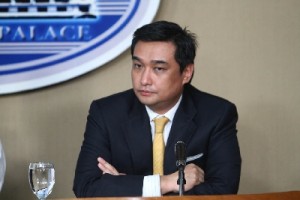Palace to Supreme Court: Don’t blame us for low rating
Malacañang has denied that there is “a wave of defiance” against legitimate court orders in the Aquino administration, as alleged by Supreme Court Administrator Midas Marquez.
“That’s the opinion of other people. To say that are our actions that is causing these reactions is trying to divert the issue,” said Ricky Carandang, the head of the Presidential Communications Development and Strategic Planning Office.
Carandang said the administration shouldn’t be blamed for the public’s reaction to court decisions that, according to him, may not have been properly explained or justified.
“I think if people are disagreeing with the Supreme Court more, it’s because the Supreme Court has made actions under the current leadership that people feel have not been explained properly or justified properly,” he told a Palace press briefing Thursday.
Marquez said that relentless battering from President Benigno Aquino III and the Cabinet members has pulled down the public trust in the Supreme Court. Its approval rating slipped from 53 percent last November to 37 percent in March.
According to Carandang, the people involved in such cases as the Flight Attendants and Stewards’ Association of the Philippines (Fasap) and the cityhood laws, where the Supreme Court reversed supposedly final decisions, were not reacting to actions made by the administration.
“They are reacting to the decisions made by [Chief Justice Renato] Corona’s court,” Carandang said.
Marquez, who also acts as the Supreme Court spokesperson, on Wednesday lamented “a wave of defiance” of court orders by the Aquino administration.
Because of the relentless battering from President Aquino and the Cabinet, the courts are beginning to lose the public’s trust, he told a media workshop in Baguio City.
“The problem when the preconditions of independence and public confidence are not met is that the judiciary loses its capacity to uphold the rule of law,” Marquez said.
‘Grievous symptoms’
He cited the following as “the most grievous symptoms”: Justice Secretary Leila de Lima’s refusal in December to comply with the Supreme Court’s temporary restraining order on the travel ban against former President Gloria Macapagal-Arroyo; the government’s inability to enforce former Palawan Governor Joel Reyes’ arrest for murder; and a Baguio City mall’s refusal to receive a temporary environmental protection order last week in connection with the cutting of trees to make way for a parking lot.
“I don’t know if I would say there is a wave of defiance. I think, that’s a very subjective statement so I don’t know if I would agree that there is a wave of defiance,” Carandang said.
Carandang said the administration was encouraging the public to follow the rule of law. “But I think what we have to show also is that decisions made by courts have to be properly explained to people as well.”
“We have nothing to do with any of these cases. Again, if people are reacting to certain decisions that have been made by Mr. Corona’s court then I don’t think you can blame the administration for the actions of the people in cases that we have no involvement in,” he said.
Scraping bottom
Coming to the defense of Malacañang, Quezon Representative Erin Tañada said the Supreme Court was “scraping the bottom in trying to look for issues” against the President.
“What’s P-Noy (Aquino) got to do with it?” asked the lawmaker, one of the three spokespersons for the prosecution panel in the impeachment trial of Corona.
Tañada, a stalwart of the Liberal Party, described as “too much of a stretch” Marquez’s claim that the President was to blame for the “wave of defiance” against court orders.
The Supreme Court, he said, was saying: “Look, all these are happening because of the President. C’mon.”
Cebu school
Marquez had also cited the defiance of St. Theresa’s College (STC) in Cebu City of the temporary restraining order (TRO) issued by the Cebu Regional Trial Court.
Five girls were barred from attending the March 30 high school graduation rites of STC for posting photos in a Facebook account showing the students in bikinis.
However, the STC chose to ignore the TRO issued by RTC Judge Wilfredo Navarro, and barred the girls, along with their parents, from attending the graduation rites.
“Midas mentioned the one in Cebu, the STC incident. Whether rightly or wrongly, we can’t judge the decision of the school (officials who) want to assert their role as an institution. They can do that, but subject to disciplinary actions the court may take,” Tañada said.
Samar governor
The lawmaker also pointed to Eastern Samar Governor Conrado Nicart Jr.’s defiance of a trial court-issued TRO preventing him from using his administration’s annual budget, which was also cited by Marquez as proof that the administration was daring the public to defy court orders.
“The governor of Samar has decided to use the budget because the services of the people in the province would be hampered (had he heeded the TRO),” Tañada said.
In all the instances cited by Marquez, those involved “knew the consequences of their actions,” the lawmaker said.
“So it’s not a matter of strictly defying the Supreme Court, but the decisions were made based on certain considerations,” Tañada said, pointing out that Marquez fully knew the high court’s powers to impose fines and imprisonment.















